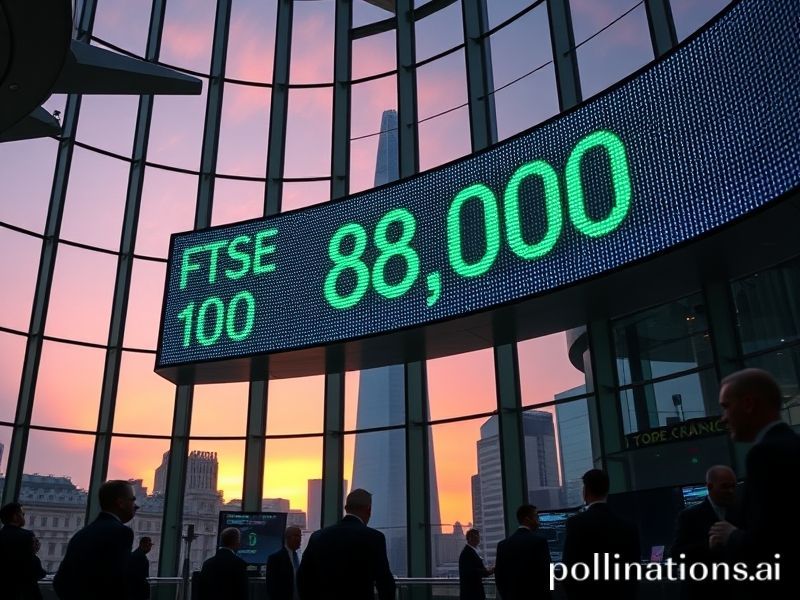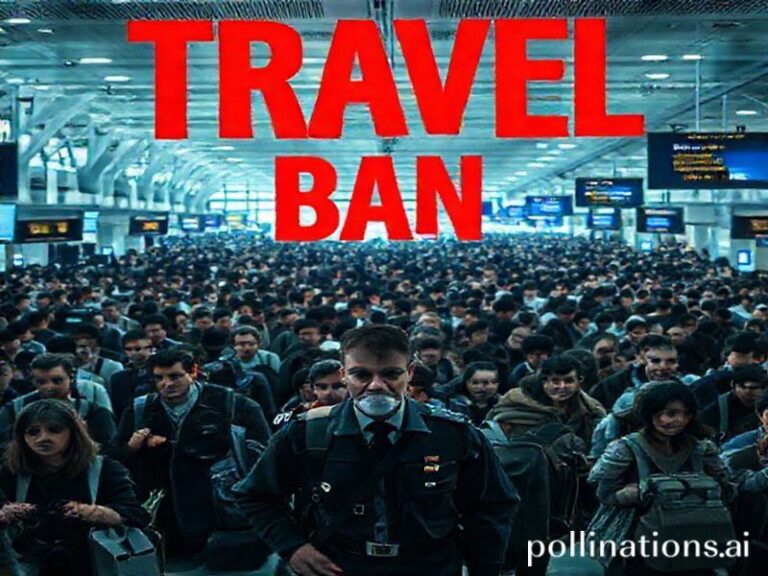FTSE 100: How a Rain-Soaked Island’s Index Still Bosses the Global Casino
The FTSE 100: Britain’s Glittering Relic in a World That Moved On
By Our Correspondent in London, Where the Rain Never Stops and the Past Never Dies
Stand at Canary Wharf on a Tuesday morning and you can almost hear the clink of champagne flutes echoing from 1987—back when shoulder pads were wide, hair was higher, and the FTSE 100 still felt like the heartbeat of global capitalism. Today the index still opens with a ceremonial clang, but the sound is less Big Ben and more antique cash register in a deserted department store. Yet 7,500 miles away in Singapore, 5,000 miles away in New York, and roughly two meters away on your phone screen, the FTSE’s daily twitch is still parsed, traded, and weaponised by algorithms that never sleep and analysts who rarely do. How did a basket of mostly mining giants, oil majors, and banks—headquartered on a damp island that voluntarily left its own continent—remain a global weather vane? Simple: money, like mold, finds a way.
First, the basics for anyone who skipped the MBA. The FTSE 100 is an index of the hundred largest companies listed on the London Stock Exchange, weighted by market capitalisation. Translation: if Shell sneezes, the index catches pneumonia; if Ocado hiccups, no one notices. Roughly 75 % of the revenue earned by these “British” champions is generated outside the UK, meaning the FTSE is less a portrait of the domestic economy and more a corporate passport stamped in every time zone. When the pound collapses—an increasingly scheduled British ritual—the index tends to rise; those foreign earnings suddenly convert into more pounds, pleasing fund managers from Toronto to Tokyo who’ve never been to Slough but know exactly how to arbitrage it.
Global implications? Picture the International Monetary Fund as a weary bartender and the FTSE as one of the regulars who keeps ordering doubles on margin. When the index drops 3 % on a rumour about Chinese copper demand, Chile feels it in Santiago, Glencore feels it in Zug, and your pension—somewhere in an Irish-domiciled ETF—feels it in the form of slightly cheaper cat food in retirement. Meanwhile, everyone pretends the correlation is rational because admitting it’s astrology for people in Patagonia vests would ruin the mystique.
Broader significance arrives dressed as irony. The UK once ruled a quarter of the planet; now it rules approximately 6 % of global market cap on a good day, and that share is shrinking faster than polar ice. Yet London’s closing auction still dictates margin calls in Mumbai. Why? Because legacy is the world’s most liquid hallucination. Traders in glass towers need a reference point older than Bitcoin, and the FTSE is the vinyl record of indices: scratchy, outdated, but weirdly soothing to people who remember when “risk” meant more than a tweet.
Of course, the index is not without modern thrills. Watch BP rebrand itself “Beyond Petroleum” while pumping more crude than ever, or see HSBC tout green bonds from its skyscraper in Hong Kong—right up until someone in Beijing clears its throat. Each corporate pirouette is applauded by ESG analysts who fly business class to climate conferences, then quietly hedged by traders who still think net-zero is a casino game.
And then there is the geopolitical cabaret. When Russia invaded Ukraine, the FTSE shuddered; when Liz Truss invaded basic economics, the FTSE shuddered harder. Both events were forgotten within a fiscal quarter, proving that collective memory now lasts about as long as a TikTok trend. Still, pension funds from Calgary to Canberra keep 5 % of their equity allocation in “UK large-cap” because diversification is the polite term for institutional superstition.
So what does the FTSE 100 tell us about the world in 2024? That capital is borderless but nostalgic. That empires can shrink to a spreadsheet cell and still boss around trillions. And that the smartest people in any room will pay good money to pretend a 1980s relic is still cutting-edge—rather like buying a vintage Rolex that only tells the time in GMT, because anything more modern feels gauche.
In the end, the index will keep ticking, a metronome for the absurd. Somewhere in a WeWork in Lagos, a fintech founder will refresh the quote; somewhere in a chalet in Davos, a billionaire will blame it for a margin squeeze on vintage Bordeaux. And somewhere in London, the rain will continue, indifferent to both. The FTSE 100: not dead, just British.







